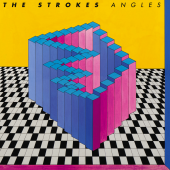
The Strokes
Angles
(RCA; 2011)
By David M. Goldstein | 28 March 2011
Along with CMG staffer (and fellow East Village resident!) Chris Molnar, I have an unhealthy obsession with the first song on Angles, the Strokes’ fourth album and first in five years. The song’s called “Machu Picchu,” and it’s equal parts Men at Work and Ace of Base, all ‘80s faux reggae groove. Its deep bass hits are far cooler than what is usually expected from Nikolai Fraiture; that furious strumming at the chorus seems to come out of nowhere. “Machu Picchu” perfectly previews the rest of Angles from that point on: it sounds like three different songs uncomfortably grafted together, and it looks awful on paper.
Except “Machu Picchu” is actually fucking awesome, and its final chorus contains the greatest Julian Casablancas vocal chord blowout since he cautioned the masses that “A BOOMBOX IS NOT A TOY” on that Lonely Island record. “Machu Picchu” is like nothing the Strokes have ever attempted before, while sliding comfortably into their M.O. of Lower East Side cool. This feat single-handedly justifies their continued existence. It does not matter if “Machu Picchu” was in reality any fun to make (and all recent press has suggested otherwise), because unlike the bulk of the butt-ugly First Impressions of Earth (2006), it at least sounds like it was.
All of the pre-release buzz around Angles has focused on how supposedly difficult it was to record, equating ten songs and 33 minutes of music with some grand Sisyphean labor. The band members were seldom all together in the studio at one time, Julian’s vocal takes were recorded separately and submitted via email, fist fights broke out over which West Village sushi joint had the freshest uni, etc. It’s like the Strokes purposely manipulated their celebrity profile to deflate expectations. But evidence of hardship isn’t entirely unfounded: Angles is a weird little thing. Production values vary so wildly across songs it’s sometimes hard to believe they’re all part of the same album. Julian Casablancas doesn’t come across like he’s singing with his band so much as on top of them—or even despite them. At every turn, Frankenstein’s monster is evoked, as if the album’s about to rear up and address the band, “Cursed, cursed creators! Why did I live?”
Too many people will listen to Angles once and declare it a train wreck. Please, don’t do that. Give it a few extra chances. Once you get past the initial WTF-ness of its odd first impressions, you’ll find the tight songwriting that initially drew you to this band endures (except on “You’re So Right,” which Nikolai Fraiture wrote; you do the math). And “Machu Picchu” is awesome.
“Machu Picchu” quickly segues into the pre-release single “Under Cover of Darkness” (Stones reference much?), which is a pretty blatant bait and switch, so much like “classic” Strokes it exists as little more than a solid re-write of “Last Nite,” and then the other songs on Angles sound nothing like that, which “Two Kinds of Happiness” makes immediately clear. The song melds coke mirror production to the Cars’ “Just What I Needed” before dive-bombing into a U2-esque chorus that might as well have leaked in from a completely different song chosen at random. Nick Valensi’s guitar solo is shamelessly epic, a more palatable update on the bizarre Middle Eastern speed-metal thing he once did on the face of First Impressions’s rather awful “Vision of Division.” Though? Wrap your head around the questionable production choices and jump cuts, and “Two Kinds of Happiness” is still a catchy song that’ll probably translate a lot better onstage.
So goes the remainder of Angles. Julian Casablancas and the other dudes aren’t content to merely rehash their first two albums; they’ll experience some expected growing pains as they attempt to warp their three-minute pop formula into shiny new equations. This is why “Games” is like a chillwave band covering Amy Grant’s “Baby Baby,” and this is why “Life Is Simple In the Moonlight” suggests Nick Valensi has been rocking Katy Lied (1974) hard.
Clearly there’s some pressure for the band to push all things forward after five years, but unlike on the rightly maligned First Impressions of Earth, Angles isn’t the sound of the Strokes hitting a wall. Angles manages litheness; First Impressions was all sludge. And despite the rumored ills surrounding the recording process, the resulting album paints the band as re-energized and optimistic, playful in a way their last record so detrimentally wasn’t.
The most memorable chorus on Angles belongs to its bossa nova closer, “Life Is Simple in the Moonlight,” an excellent way to cap off the half hour, though far more downcast than what one usually associates with a Strokes finale. Conspiracy theorists will hear “So we talk about ourselves in Hell / To forget the love we never felt” and (wrongfully) peg it as a Casablancas indictment of the band’s seemingly dysfunctional relationship. But Angles insists the Strokes still have a viable future…should they want it.





